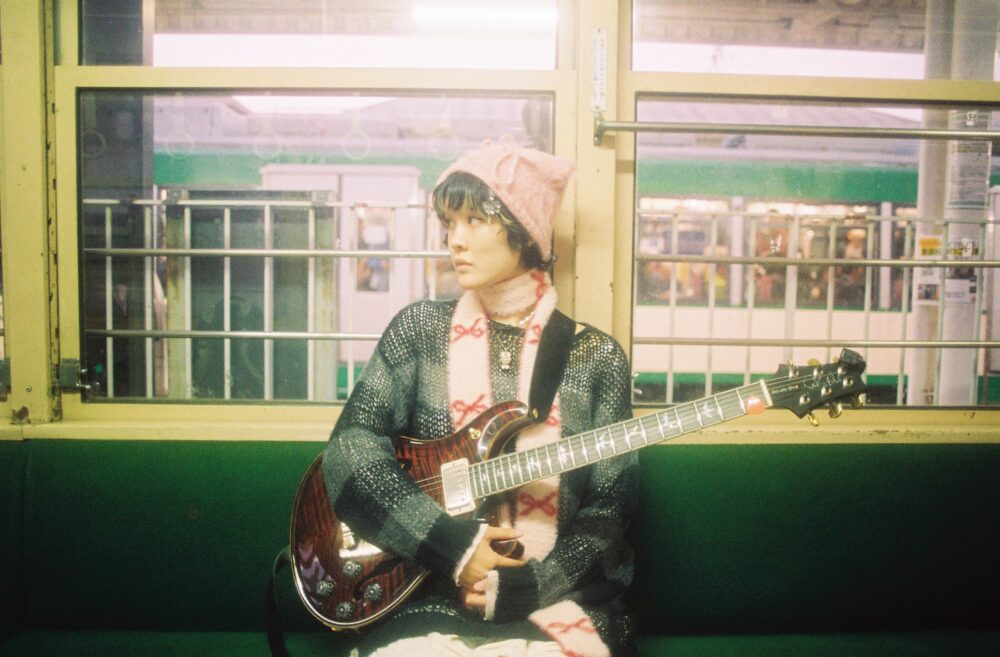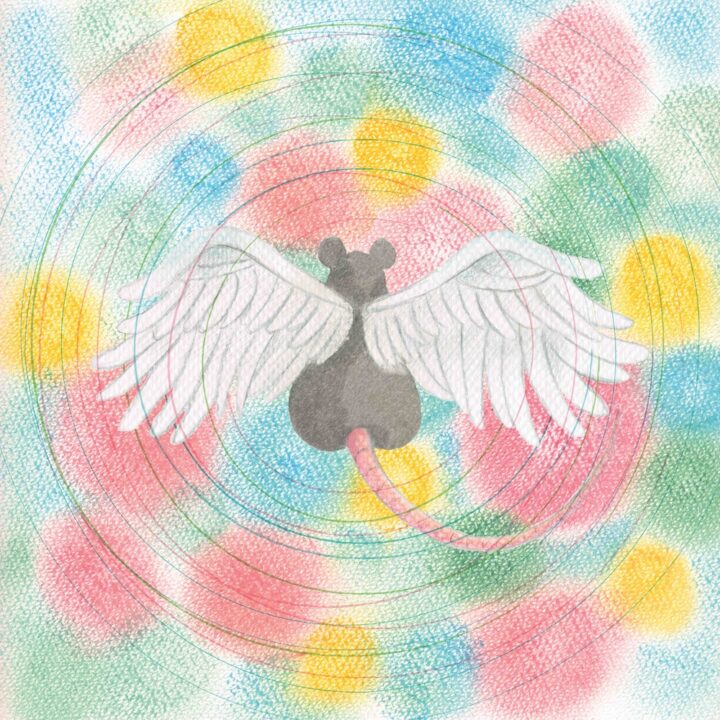Artist To Watch: Mei Semones

Alec Hirata
The first time you hear Mei Semones, you’re likely to contort yourself into some weird shapes in an attempt to describe her music. My first pass, “Pat Metheny and Gilberto Gil start a Midwest emo band with a folk singer who’s fluent in English and Japanese,” nearly tore my hamstrings. That was in reference to fall 2023’s “Wakare No Kotoba,” and in fairness, it’s quite an ambitious blend of pastoral jazz, bossa nova, emo, and baroque pop.
About a year after “Wakare No Kotoba” appeared on Semones’ third EP, Kabutomushi, the 24-year-old singer-guitarist is readying her debut album. Animaru — out May 2 on Bayonet Records — is a more dynamic, assertive listen that sees Semones and her band becoming more of a seamless unit, furthering their unique blend of influences. The group is rounded out by Noah Leong on viola, Claudius Agrippa on violin, Noam Tanzer on upright bass, and Ransom McCafferty on drums—an unorthodox, string-heavy quintet that serves to both smooth out and deepen the twists and turns of Semones’ compositions.
Crammed into a corner of a crowded Bushwick cafe filled with work-from-home refugees, Semones was soft spoken but self-assured while explaining how music has helped her to find herself as an adult. Animaru plays like a motivational internal monologue made to remind someone why they pursue their interests, why they moved to the big city, why their friends and family matter so much to them. Nowhere is this more apparent than “I Can Do What I Want,” a roiling cauldron of tempo shifts, fluid drum fills, and chiming chords built around a central mantra: “I am going to do this the way I wanna do it.”
“I think it’s just where I’m at in my life,” Semones says when asked about Animaru’s overarching themes, “graduating college and moving to New York and then being able to make the transition to doing music full-time. I feel like all of these steps have helped me find myself more — who I am and who I want to be, my goals, all that stuff. This album is just a representation of my journey towards becoming more confident in myself and who I am as a person and who I am as an artist.”
That’s apparent from the opening seconds of track one, “Dumb Feeling,” which begins: “This is a special place/ But how many days do I/ Really feel I think I’m special too?” This hesitant sentiment is paired with a modest-but-nimble bossa shuffle, and when that shifts into a more wide-open orchestral section, so too does Semones’ view of her place in the city: “But when the train comes to my stop/ I won’t try to fight it.”
The fact that such a talented guitarist has to psych herself up to boost her self-esteem is a bit of a shock — I’ve met musicians who are half as talented with five times the ego — but it explains Semones’ background as a longtime student of the instrument. Starting at a young age, she remembers thinking, “This is not exactly what I had in mind, playing ‘Mary Had A Little Lamb’ on a nylon string,” before moving onto learning songs by Led Zeppelin, Pink Floyd, and The Beatles. In high school, she started playing in her school’s small combos, and eventually decided to attend Boston’s Berklee College of Music for jazz performance.
“People obviously have really mixed opinions about music school, and some people hate it, but I actually really enjoyed my time at Berklee,” Semones says. “Everything I was learning, I was excited about. People might be like, ‘Oh, ear training is so annoying.’ But I genuinely enjoyed it.”
A constant foundation throughout Semones’ jumps between genres is her music-nerd studiousness. Despite the playful, inventive vibe of the music she writes, I’ve never heard an indie rock guitarist that is so obviously not self-taught — her delicate finger-picking on “Tora Moyo” is too precise, even her heaviest riffing on “Rat With Wings” scans as near-classical. I don’t think many musicians bumming around Bushwick practice spaces would know what to do with her, but thankfully, four of Semones’ Berklee classmates decided to also make the move from Boston to NYC. Out of all of them, she’s been working with Leong the longest.
“The first song that I put out was called ‘Hfoas‘ [in March 2020],” she says. “Noah was helping me record and engineer it, and when we were mixing it at his apartment, he was like, ‘What if I put the string arrangement at the end?’ That was not anything that I had intended to do for the song at all, but he was excited to try it. So he did it, and I thought it was so beautiful, and I thought it fit really well with the songwriting style.”
Leong eventually brought his friend Agrippa in to play violin on another song, and they’ve stayed by Semones’ side ever since. “I never thought that [strings] would be such a big defining part of my music,” she says.
“Hfoas” was also the first time Semones wrote bilingual lyrics. “I think that’s, like, why it was the first song I put out,” she says. “It was the first song that I felt really represented who I want to be as an artist and as a person, too… With writing in two languages, it definitely took some time to get to that point, but it did feel natural as I started doing it.”
On Animaru, she found herself interspersing English and Japanese more frequently than ever. ” I used to split it up section-by-section, but more and more I’m doing it sentence-by-sentence, and sometimes even within the same sentence,” she says. “If this word in English doesn’t fit, like it’s got too many syllables, I’ll change it to Japanese. It doesn’t make sense to anyone who doesn’t speak both languages, but it makes sense to me.”
New single “Zarigani,” released this morning, is written to someone else who might be able to understand it: Semones’ twin sister. The title translates to “crayfish” in English, and Semones’ lyrics reference her and her sister’s childhood in Michigan, catching the little crustaceans in a creek with friends. It’s just one of many animal references on Animaru, which makes sense, as the title refers to the Japanese pronunciation of the word “animal.” “I do love animals a lot,” says Semones, adding that she became vegetarian after entertaining the thought, “Why should I be able to eat a cow if a cow can’t eat us?” She continues, “But in terms of the album, a big theme is following your instincts. I feel like that’s why animals keep popping up. You know, a dog is gonna sleep when it wants to sleep, and when it’s hungry it’ll try to get food.”
This is where the central tension lies in Semones’ music, what imbues its very pretty, technically dazzling aspects with emotional resonance. You get the sense that she put in so much time dedicating herself to the craft of jazz guitar and composition, but has only recently popped her head up and realized that there are no rules to self-expression. Animaru’s lyrics (the ones in English anyway) can seem over-obvious at first — like, duh, you can do what you want, you’re an adult — but the record on a whole is a powerful statement of self-affirmation.
Semones said one thing that broke my heart but also made me hear Animaru in a different light: “Growing up, I was really insecure and having trouble finding myself. I think I used to not like myself, and now I’m finally in a place where I do.”
Animaru is out 5/2 on Bayonet Records.







